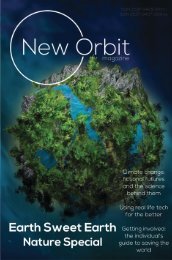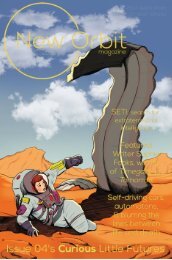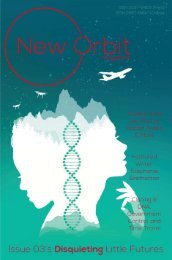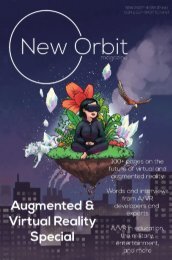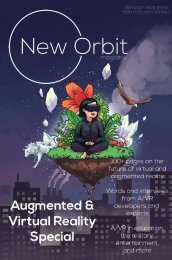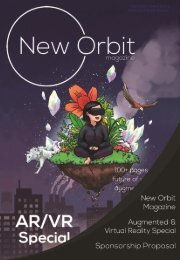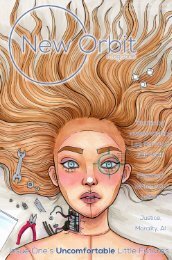New Orbit Magazine Issue 08; Feb 2020, The Future of Animals
- No tags were found...
Create successful ePaper yourself
Turn your PDF publications into a flip-book with our unique Google optimized e-Paper software.
it is they’ve tried to eat. In a similar vein, the
things we love to eat, often too much, at this
point in society, are things we are
evolutionarily suited to search out. Sweet,
salty, and rich foods were necessary treats in
short supply before the agricultural age and
the food security that eventually came from it
– and those are the flavours that modern
palates seek to replicate in the food we
choose to eat.
Not so, on our alien paradise. The meat of
animals that we have no evolutionary history
of, made from substances and molecules that
are unfamiliar to us, would likely set off all
kinds of warning signals to the curious
human taste tester, whether we needed them
or not.
If we’re chasing down alien livestock purely
for our pleasure or to add a fancy listing to
gourmet menus back on earth, then we might
be able to move past this. If, like the
characters in Cyclic Hunting, we’re hunting
unfamiliar beasts and harvesting unfamiliar
plants to survive, then even if it doesn’t kill
us, it'll take some getting used to.
Most terraforming plans are made without
the expectation of a lush biological ecosystem
on their target planet, and take special care to
define how they're going to feed whichever
terraformers they intend to leave there.
Sometimes these plans involve taking along
livestock, or freeze-dried seeds, or colonies of
mushrooms or the like. Unfortunately, with
the above science in mind, even Earth
animals and plants we took along with us to
our newly discovered living planet might do
little to solve our starvation problem. The
ground itself would be made of the same
unfamiliar organic matter as the roaming
animals. Even if our seeds could take root,
either they’d struggle to metabolise the
nutrients in the soil just like we would, or
they’d take on some of the same organic
properties and become partially poisonous,
toxic, or nutritionally void should we try to
eat them. Brian Aldiss’s 1958 novel Non-Stop
describes the poisoning of the whole
population of a ship of human terraformers,
thanks to an unfamiliar amino acid that their
crops took on as a result of being grown in
alien compost. Matt Damon’s character in
the very popular The Martian was only able to
(ingeniously) grow his thanksgiving potatoes
using compost made from whatever he could
scrape together from the dehydrated human
waste in his station – as waste from humans
was the closest thing on the planet to what
potato plants would be able to consume.
There are some small chances that we’d get
lucky – through chance, or through medical
science. If we found a world where we could
digest the animal life – though it’d be likely
that we’d be eating alien steaks more for taste
than for sustenance, as we wouldn't be able
to metabolise as much of their makeup as we
would of animals and plants that we’ve been
eating for millennia – it’s not infeasible that
we could eke out a living on a new
terraformed home, and perhaps as enough
generations went by, our digestive system
would realign to one more fitting to our
Earth 2.0.
In just the right ecosystem, there’s a chance
it wouldn't even take generations. A relatively
new medical procedure called a
(even more
recently, an oral medication affectionately
known as a “Poop Pill”), that can hold and
transfer the living bacteria present in the




